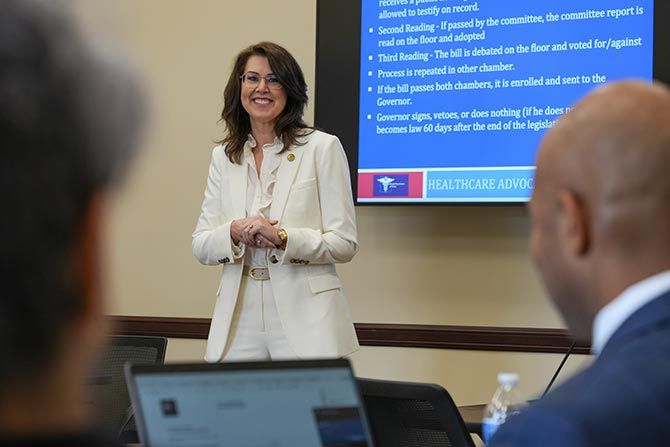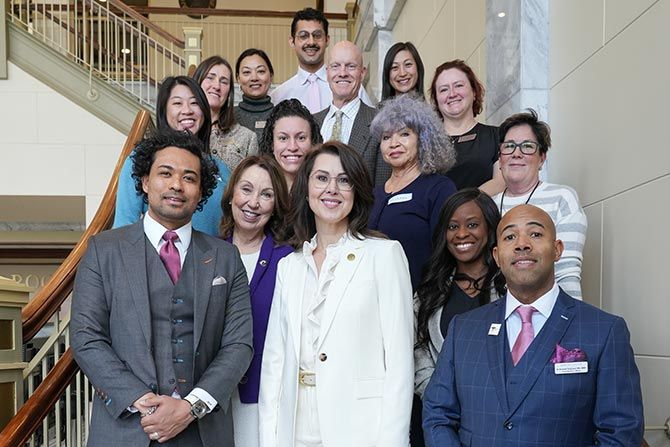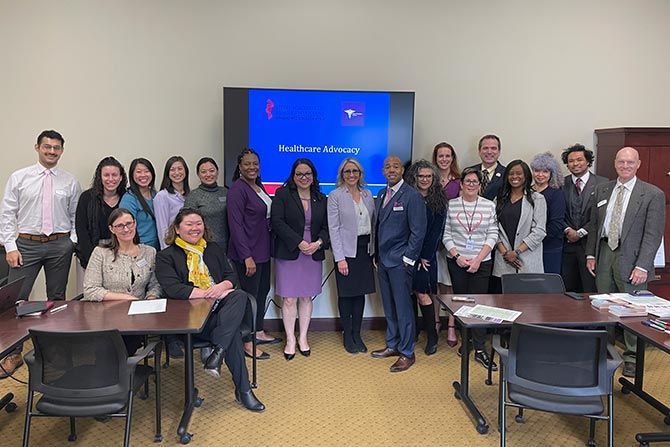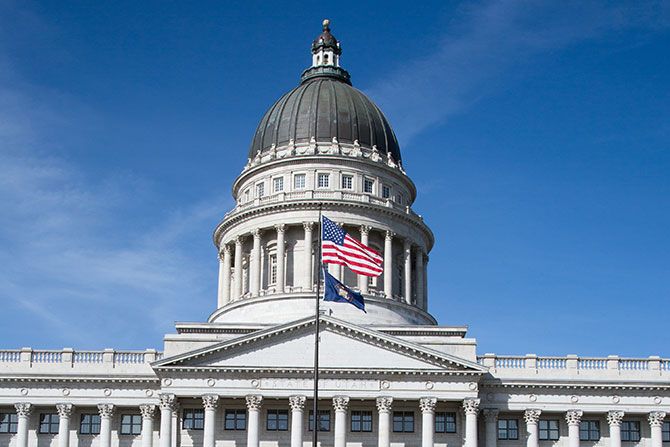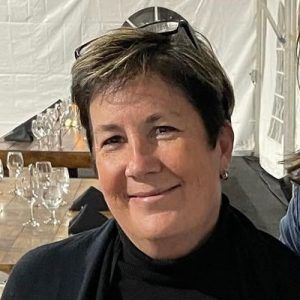The 2023 Legislative Session came in like a lion and went out like a … lion. If I summed up this session in just a few words, I would call it frustratingly successful. There were some really tough outcomes, but there were also some pretty significant wins. I realize, as I have looked back over previous legislative reports, this seems to be a somewhat consistent theme — great bills, horrible bills, good debates, frustrating debates, legislators I love working with, and legislators I don’t. It really is just a microcosm of our national policy debates with all the tribalism, messiness, hard work, and cautious optimism.
Each year, we reorganize our Legislative and Advocacy Committee, inviting statewide members to join our weekly calls and share their insights and expertise, as we review bills and determine our positions. The 2023 session had 929 bills introduced and 575 passed, in addition to countless more bill files opened that were never released. Of the total bills passed, a whopping 363 passed in the final week of the session. With only 45 days in the session, you can imagine how quickly things can move. Adam Brown, an Associate Professor of Political Science at BYU, maintains legislative statistics and found the average time spent on bills was 10 minutes. If you’re a policy nerd like me, you should click the link below and definitely check out Brown’s annually updated Guide to the Utah Legislature.
https://adambrown.info/p/research/utah_legislature
We were in the thick of it from day one as I presented our appropriation request for Medicaid well-care visits. Thanks to our incoming President, Dr. Michael Chen, we learned that despite expanding Medicaid, Utah never approved the codes for an annual well-care visit for adults. As we all know, an ounce of prevention is worth a pound of cure, and providing these important annual visits has the potential to save significant money as well as save lives. Whether it be diabetes, hypertension, hypothyroidism, heart disease, or cancer, early detection will always be critical for effective treatment and hopefully prevention.
The codes come with a surprisingly low cost — if every single adult Utahn on Medicaid got an annual well-care visit, the total cost would be less than $250,000. While that may sound like a lot to a personal budget, when you have an annual state budget of $29.4 billion, that’s tantamount to checking the couch cushions for change.

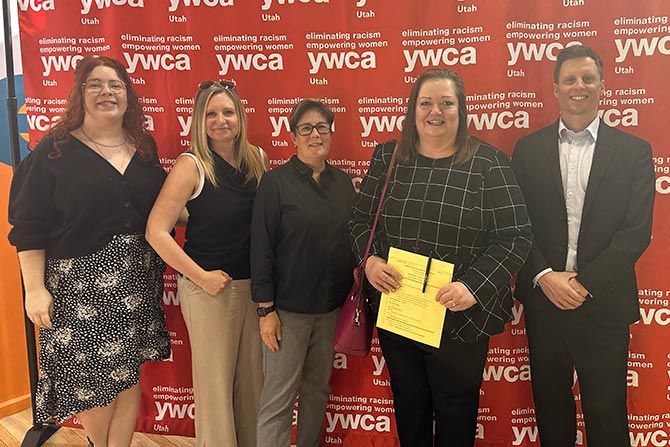
UAFP CEO Maryann Martindale joins Governor Spencer Cox, Lt. Governor Henderson, several legislators, leadership from DHHS, and fellow advocates from AUCH, UPHA, and American Heart Association for a bill signing for SB133 Modifications to Medicaid Coverage which extends postpartum coverage for many women on Medicaid to 12 months.
Fortunately, with a combination of naivete and hutzpah, we were able to get the request included in the Governor’s budget, meaning the process was a bit less cumbersome and didn’t require a separate bill file, just a champion who we found in Representative Marcia Judkins. It took some frantic penultimate day-of-the-session lobbying to get sufficient funds, but beginning July 1st, you will be able to provide well-care visits to your adult patients on Medicaid. Thanks, Dr. Chen!
Another big priority bill was postpartum extension, SB133 which will extend postpartum coverage to most women who qualify for Medicaid to 12 months. Under current Medicaid provisions, a woman giving birth is covered for only 60 days. Data shows that the majority of complications and maternal mortalities occur between 45 and 365 days. Passing this bill was a very heavy lift, but through great collaborative efforts between us, Association for Utah Community Health (AUCH), Utah Public Health Association (UPHA), and the American Heart Association Utah Chapter, the bill succeeded with full funding and will go into effect this summer.
We supported a total of 40 bills — some passed, some didn’t — and we prioritized our focus on those bills we believed would make the biggest impact and had the greatest chance of success. But we would be remiss if we didn’t discuss a couple of disappointments. The legislature continues its erosion of women’s reproductive autonomy and also weighed in this year with a pause in gender-affirming care. The legislature moved pretty quickly on several of these bills, leaving those of us working on behalf of the medical community frustrated with the lack of time to counter misconceptions and inaccuracies and to truly present and debate the science.
These are definitely hot-button issues and we recognize that our members do not all hold the same position on these procedures. However, our priority is not the specific procedure, but rather to preserve the physician/patient relationship, to protect the discussions you have with patients over various treatments — regardless of the procedure — and to ensure physicians are not under threat of licensure or legal impacts for providing safe, scientifically-sound care. Our hope is to continue these important discussions with legislators and work to ensure that physicians and their patients are able to make critical healthcare decisions outside the realm of political and societal influences.
As we continue our advocacy work, we welcome input from our members on issues they would like us to address, gaps or areas that could be improved or fixed, etc. As my early example of well-care visits shows, input from members, such as Dr. Chen, is vital for us to be effective in our advocacy.
If you would like to get more involved, please consider joining our Advocacy Committee. You can sign up using the link below.
https://utahafp.regfox.com/join-a-uafp-committee
To see our final bill tracker, go to https://utahafp.org/utleg2023
Family Medicine Day on the Hill
Each year during the legislative session, UAFP hosts a Day-on-the-Hill. It is an opportunity for our members to learn about the legislative process and meet with legislators to discuss various bills.
This year we hosted the Black Physicians of Utah (BPOU). We began the day with “Legislature 101” — a presentation outlining how the Utah Legislature works, what is entailed in passing legislation, information about the makeup, and general advocacy information. We worked closely with Dr. Richard Ferguson, the founder and President of BPOU, to discuss ways for physicians of color to advocate, the critical need for diversity, and presented several bills that were of specific interest to the group.
We invited legislators to join us and present some of their bills, and this year we had an outstanding showing, including numerous representatives and senators, many representing those in attendance. We also were fortunate to have a special visit from Lt. Governor Deirdre Henderson. She spoke of the importance of healthcare to the Governor, the need for more primary care physicians and especially the need for diversification of the healthcare workforce.
The event was informative and gave attendees a good insight into the legislative process and showed them how to be active participants in health care advocacy. Huge thanks to Dr. Ferguson for joining us and bringing this important perspective to our advocacy work.
Mark January 29, 2024 on your calendars to attend next year’s event. We’ll be joined by the Association for Utah Community Health (AUCH) and Utah Public Health Association (UPHA) for Primary Care Day on the Hill.
UAFP hosted Black Physicians of Utah (BPOU) for a Day-on-the-Hill, and we were joined by several legislators and even had a special visit from Lt. Governor Diedre Henderson.
